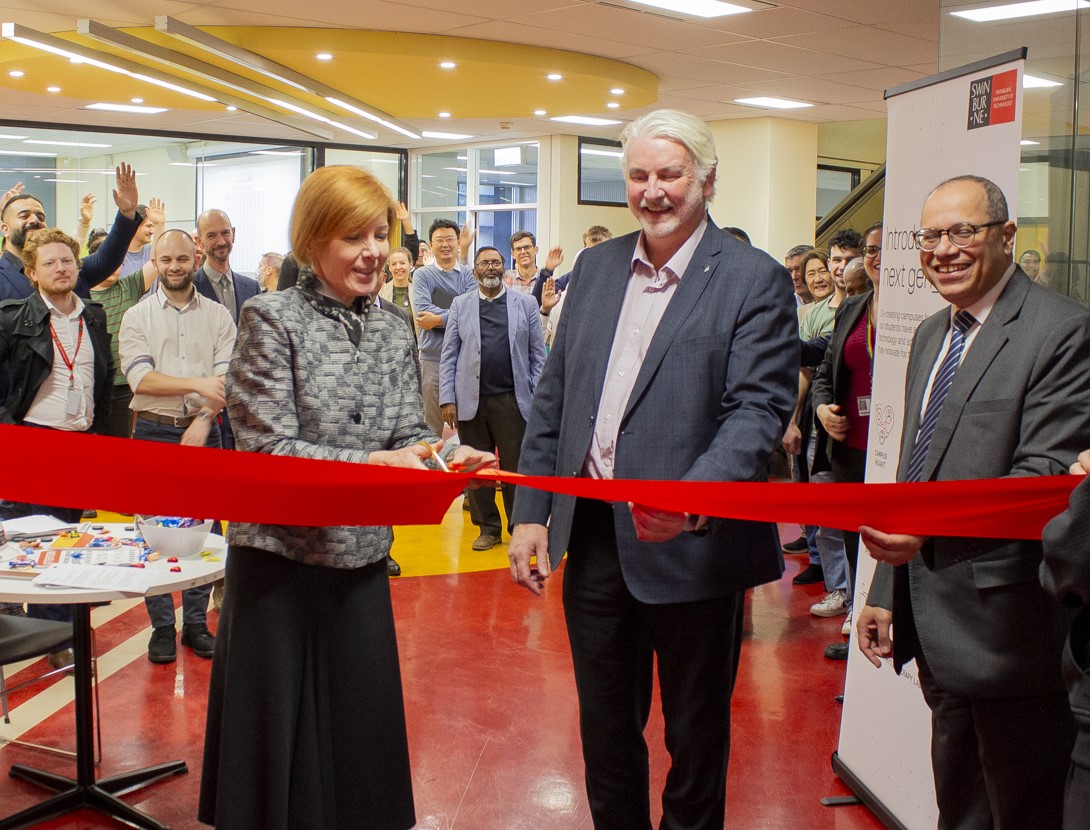Mechanical engineering gets a next gen_campus transformation

Vice-Chancellor and President Professor Pascale Quester with Director of Trades and Engineering Technologies Bryan Ornsby and Dean of the School of Engineering Professor Emad Gad offically opening the Applied Mechanics Hub with a ribon cutting. Image: Swinburne Photo media student Lucy Mann
In summary
- Swinburne’s new Applied Mechanics Hub provides more accessible, fit-for-purpose lab space for mechanical engineering students
- The new facility caters to a variety of mechanical and other engineering specialities offered through Swinburne’s comprehensive range of degrees
- The project is part of Swinburne’s next gen_campus transformation, delivering campuses for the future where we can learn, connect and innovate together.
Swinburne University of Technology’s mechanical engineering facilities have been upgraded as part of our next gen_campus transformation.
The new Applied Mechanics Hub, comprised of thermodynamics, statics and dynamics labs, offers more accessible and fit-for-purpose lab space, ensuring our mechanical and other engineering students have access to the latest technology and advances facilities.
Alongside eight other next gen_campus projects, the hub responds to the needs and priorities of a contemporary student to deliver a next gen_experience throughout their studies.
More than 70 students and staff gathered to celebrate the new facility this week with afternoon tea and equipment demonstrations.
Swinburne Vice-Chancellor and President Professor Pascale Quester was joined by School of Engineering Dean Professor Emad Gad and Trades and Engineering Technologies Director Bryan Ornsby for a ribbon cutting ceremong to officially open the new labs.

Preparing our students to become future industry leaders
The new Applied Mechanics Hub caters to a variety of mechanical and other engineering specialities offered through Swinburne’s comprehensive range of vocational educational qualifications and undergraduate and post graduate degrees.
The Thermodynamics Lab will provide an environment for students to study heat transfer and its application as a heat exchanger for variety of applications.
In the Statics Lab, students will gain hands-on, experiential learning using specialised experiments for analysis of trusses and beams.
The Dynamics Lab will provide structural mechanics students with an understanding of the mechanics of materials and structures, focusing on the stress, deformation and stability of structural components. Engineering dynamics students will benefit from the space to study the mass moment of inertia, conservation of angular momentum and gyro effect, while machine dynamics students will synthesize and solve problems on linkage mechanisms, mechanics of machinery, engine dynamics and vibrations in the space.
These labs will compliment Swinburne’s existing engineering facilities, including the Rapid Prototyping and Manufacturing Laboratory with its 3D printing and laser cutting equipment where students can manufacture parts for projects and research, and the Student Workshop where they can access more traditional hand and power tools.
Professor Emad Gad, Dean of Swinburne’s School of Engineering, said the labs validate theory students learn in lectures with hands-on experiences.
“This is what really sets our degrees apart – the practical learning that sets our students up with a solid foundation for their careers,” he said.
“That practical experimentation is a key part of their development as engineers and innovators, and we’re proud to have delivered this new facility to give them even more opportunity to engage in formal and informal practical training.”

Engineering students learning in the Applied Mechanics Hub. Image: Swinburne Photo media student Lucy Mann
Delivering a next gen_experience now
Swinburne has embarked on a large program of work to transform our physical environment and deliver a better student experience.
next gen_campus considers our students' needs and priorities for how they will use these facilities and spaces to work, study and interact with each other.
In addition to the Applied Mechanics Hub, eight other transformative projects will revitalise our Hawthorn, Croydon and Wantirna campuses.
The first to reach completion were new Indigenous Learning Circles, officially opened at all three campuses last month.
The Construction Simulation Hub and Digital Teaching Spaces are also nearing completion and are expected to be ready for students in coming months, with the Physiotherapy Lab set to be open to students in Semester 2.
In a key milestone, the new 24/7 Latelab and student hub began construction in March.
Swinburne Chief Operating Officer Nancy Collins said these projects all embody Swinburne’s next gen_campus vision to deliver an innovative educational experience across all three Melbourne campuses.
“The Applied Mechanics Hub is a key part of our broader next gen_campus work to deliver an improved experience from enrolment to graduation,” she said.
“This is just one of the many ways we are becoming the prototype of a new and different university, which will ultimately mean incredible improvements for our students’ satisfaction and outcomes.”

-
Media Enquiries
Related articles
-

- Aviation
- Sustainability
- Engineering
Australian-made sustainable powders to drive the future of advanced manufacturing
A high-tech spinout from Swinburne University of Technology will deliver Australian-made High Entropy Material (HEM) powders, developed from recycled industrial feedstocks, to advanced manufacturing and 3D printing facilities.
Thursday 27 March 2025 -

- University
- Engineering
- Sustainability
New Digital Manufacturing Hub launches at Swinburne to level up Australian industry
Australian manufacturing productivity and resilience could rise by as much 30 per cent, thanks to a new Digital Manufacturing Hub led by Swinburne.
Monday 17 March 2025 -

- Science
- Sustainability
- Engineering
International project to support Australia’s transition to clean energy with next-gen electrolysers
Swinburne researchers are part of an international team is developing new electrolysers to support Australia’s transition to clean energy.
Wednesday 05 February 2025

